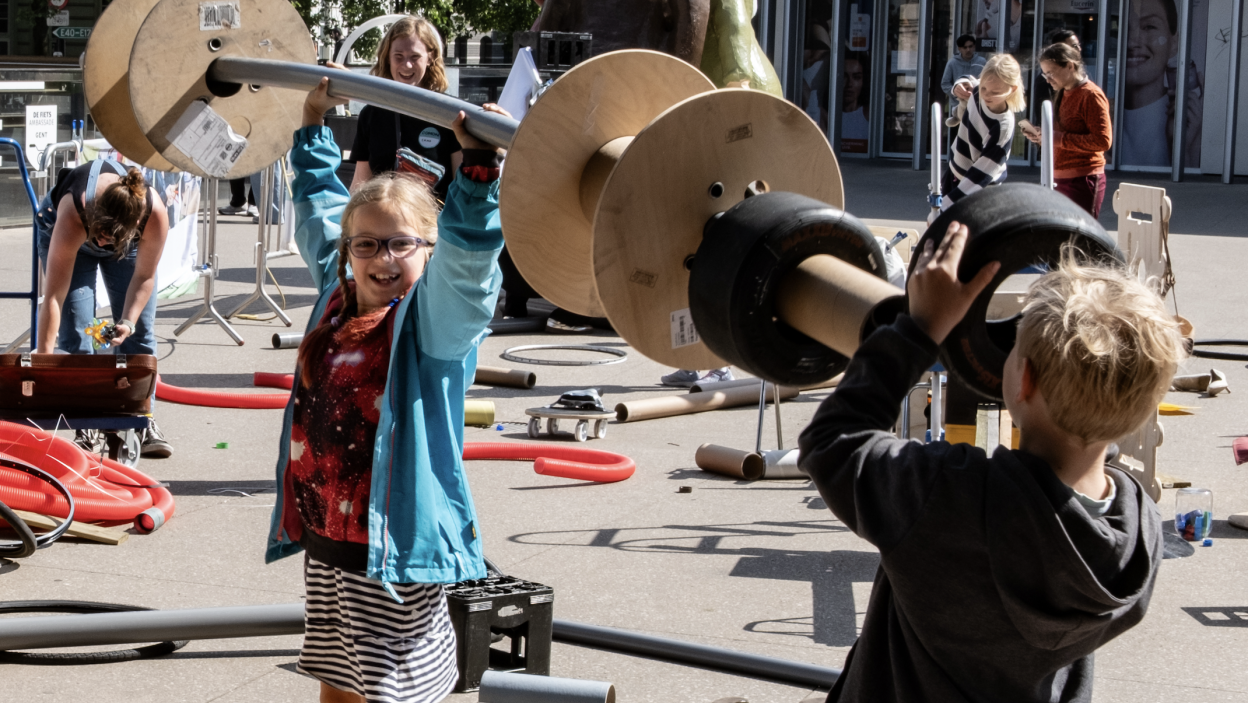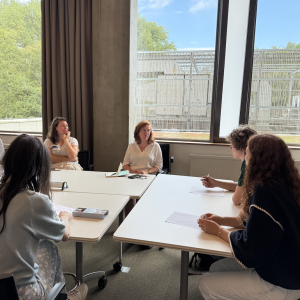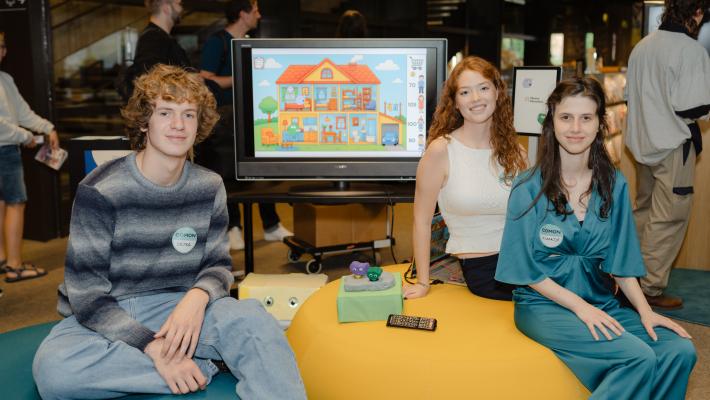What are the biggest challenges related to parenting stress?

Parenting stress has many different facets. During our events, we worked with parenting experts to map out the challenges parents face today. From performance pressure and the digital divide to the lack of a supportive network — the stories moved everyone. Curious about the ten most common parenting stress challenges in the city? Discover them here, ranked by how frequently they occur.
1. Doubting how to act
Parents struggle to translate parenting theories into their own family situation. Researchers, experts, influencers... they all come with their own advice and theories. There is an overwhelming abundance of advice. But which advice is actually correct? The many contradictory recommendations increase parents’ insecurity. They find it hard to filter information and begin to doubt their own decisions.
On top of that, parents are confronted with high societal expectations. Social media amplifies this by promoting unrealistic images of children. Parents feel like they are on their own, and experience anxiety and performance pressure in their parenting role.

2. Individualisation
Many parents today feel alone in their parenting responsibilities. In the past, there was often a network of family, neighbours, or community members parents could rely on. That traditional support system around the family is gradually disappearing, along with the spontaneous support it provided. In urban environments, there is a lack of accessible physical spaces where parents can meet each other. This leads to isolation, especially for newcomers or single parents.
Due to increasing segregation, families often live next to rather than with each other. Parenting happens behind closed doors, and the taboo around asking for help remains strong. As a result, uncertainty and stress pile up more quickly. At the same time, many parents lack role models or opportunities to exchange experiences with others in similar situations. The feeling that you have to do it all on your own can be a heavy burden.

3. Work–life balance
Many parents struggle to balance work and family life. At work, you're expected to be always present, flexible, and available — as if you don’t have children. At home, children expect care, attention, and presence — as if you don’t have a job. This double expectation creates constant tension and guilt. There's often little time left to simply be a parent.
At the same time, childcare isn’t always affordable or easily available, especially for parents with irregular working hours or during school holidays. Parents are forced to juggle schedules, care networks, and work hours creatively. For single parents or those without a support system, this becomes even more complex. The pressure to excel at everything is high, but the resources to do so are limited. This drains energy and affects the well-being of the entire family.


4. Poverty
Parents living in poverty face stress and difficult choices on a daily basis. A lack of money often forces them to choose between basic needs like food, heating, or transport, and leaves little room for leisure activities, parenting support, or school expenses. This increases the risk of social exclusion, also for their children.
Financial worries take up mental space, leaving less energy for patience, attention, and care. On top of that, many parents feel ashamed or guilty, which creates barriers to seeking help. While many initiatives are intended to be open to all, they often don’t feel accessible in practice. People living in poverty also face more stigma and prejudice, which undermines trust in services and support systems.
Poverty makes parenting not only more expensive, but also more isolating and difficult.

5. Digital gap
Technology is evolving rapidly, and many parents feel left behind. While their children navigate apps, games, and social media with ease, parents often lack the knowledge to provide proper guidance. What is safe? What is normal online behaviour? Where’s the line between screen time and relaxation? Parents feel uncertain or even powerless, afraid of losing control.
There is also a generational clash in media use and digital habits. Not all parents have sufficient digital skills or access to technology, which creates a gap — not just between them and their child, but also between them and the school or wider society. Digital inequality makes it harder to keep up, let alone take the lead. Parents need support to confidently embrace their role in today’s digital world.

6. Mental health
Parenting is an intense experience, yet it often remains surrounded by silence. Many parents don’t dare to share their doubts or struggles out of fear of judgement or misunderstanding. Shame and the pressure to be perfect keep many quiet, even when things are tough. There’s little space for honest conversations about failure, frustration, or fatigue.
Social media reinforces these feelings: images of perfect families and “successful” parenting increase pressure and make parents doubt themselves. Children also feel that pressure, which can affect their emotional well-being.
At the same time, the division of caregiving tasks remains unequal: mothers still carry the largest share of the parenting burden. This limits their career choices and personal growth. Fathers who take on a more active role often face misunderstanding or a lack of support. Parenting and mental well-being are deeply connected and deserve more openness.

7. Diversity
In a diverse society, parents with a migration background face additional challenges. Within the family, cultural differences between generations can clash: children grow up in a different context than their parents, with different values, languages, and habits. This can lead to tension and misunderstanding.
At the same time, these parents often face structural barriers in society, such as language hurdles, discrimination, or a lack of culturally sensitive support. Their parenting style is more quickly questioned, even when it comes from a place of love and care. Because of a lack of recognition, many parents feel unseen or misunderstood by institutions or support services. They experience less trust in systems and sometimes don’t know where to turn for help.
Parenting in a multicultural context demands extra resilience and support — but also more space for dialogue, respect, and equality.
8. Playground and free time
Playing outside is becoming less and less self-evident. Children spend more time behind screens and less in the open air. Many parents feel uncertain: they give their children less freedom out of fear of traffic, unsafe situations, or social pressure. At the same time, many neighbourhoods lack safe and green play spaces. Paved squares or busy streets don't invite free play.
As a result, children miss out on opportunities to move, be creative, and connect with others. For parents, this leads to more planning and stress: free time needs to be organised and supervised. Not every family has access to structured activities or a garden. Playing, moving, and exploring should be normal and spontaneous, but today they have increasingly become a privilege. This limits both children's freedom and parents' breathing space.

9. Law enforcement
For some young people, encounters with the police or other law enforcement agencies are not neutral, but negatively charged. They feel targeted or unfairly treated, which leads to distrust in institutions that are supposed to guarantee safety. These experiences leave a mark, especially when they happen repeatedly or can’t be openly discussed.
That distrust often finds its way home: parents feel powerless or angry, and struggle with how to both protect their children and prepare them for the reality outside. They are forced to balance between respecting authority and teaching their children to be resilient in the face of injustice. This puts additional pressure on the parenting situation.
Parents need recognition, support, and open dialogue. A society in which young people feel seen and heard starts with respectful and equal treatment — including from institutions.
10. Children with additional needs
Parents of children with a disability, developmental disorder, or other specific needs often face a system that does not provide adequate support. The search for appropriate help is long, complex, and exhausting. Many parents constantly find themselves acting as caregiver, mediator, and case manager.
There is too little tailored support, even though every child is unique. Waiting lists are long, expertise is fragmented, and coordination between education, healthcare, and leisure often fails. As a result, parents are left feeling frustrated, exhausted, and alone.
They also regularly encounter misunderstanding or prejudice, both in society and among professionals. All of this places enormous pressure on the family’s resilience. Parents need a support network that truly listens, thinks along, and shares the responsibility.



